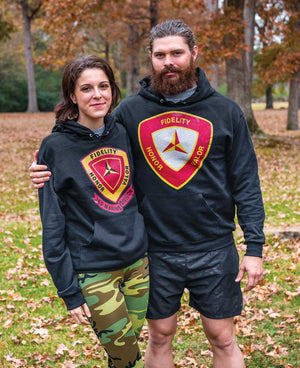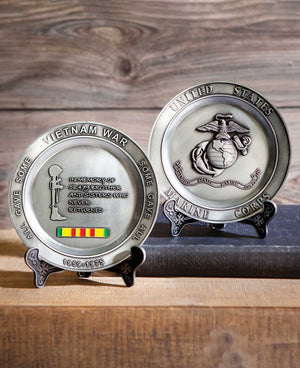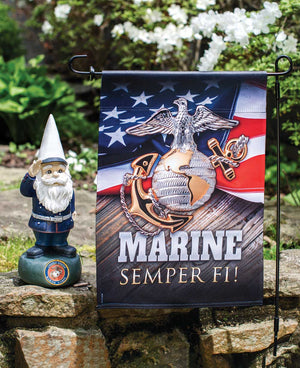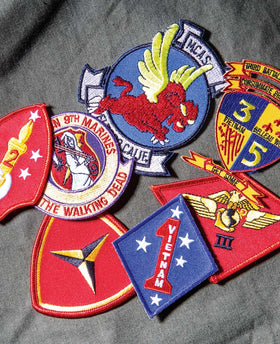The Dalles Chronicle, 9 FEB 2013
Article by RaeLynn Ricarte
The Dalles — US Marine Corps Capt. Daniel Brophy walked for the last time on Feb. 23, 1969, the day his body was broken by a .50 caliber bullet – but the warrior spirit that took him to Vietnam has enabled him to continue living with purpose from a wheelchair.
He has spent the past four decades helping other veterans realize that, although the war has come home with them, they can overcome combat-related injuries, both physical and mental. "Combat veterans all have varying degrees of PTSD (Post Traumatic Stress Disorder)," he said.
"When someone was in trouble, the flight schedule went by the wayside and we were there," said Brophy. "Anytime there was a gunship in the air, the infantry were happy because they knew there was going to be support."
He served as executive officer for the aerial reconnaissance team, which included nine helicopters and crews who earned a Presidential Unit Citation for running highly effective missions within their Tactical Area of Responsibility around Da Nang Air Base, in the northeast coastal region of Vietnam. That location was known as the "rocket belt" due to the large number of rockets and mortars that rained down on soldiers from the Republic of Vietnam and their U.S. allies.
The helicopters on the team typically flew about 100 feet off the ground and Brophy and his crew had been shot down three times during the deployment.
On Feb. 29, he and his fellow Marines were determined to protect infantrymen dug into the hillside at the triangular point of a pass and in danger of being overrun by a larger enemy force.
"Those guys were stressed and up to their elbows," Brophy recalled.
He was on an adrenaline high from an action-packed morning and vigilantly scanning the terrain below for threats. When he spotted adversaries, he fired off tracers from his M14 that guided his gunner – who would later be killed in combat – to these targets. He also threw purple smoke grenades to mark an area for incoming fighter jets to launch a rocket or napalm strike.
His crew was inflicting heavy losses on the enemy about 11:30 a.m. when Brophy felt something slam into his body with great force. The bullet that was capable of penetrating three-fourths inches of armored plating had come through the hull of the Loach, entered his foot and decimated his knee before hitting the carotid artery in his neck. Blood poured from his wounds and he quickly sank into unconsciousness as crew members scrambled to save him and the pilot wrestled with controls to fly the helo that had lost hydraulics to a Navy medical station near Dia Loc Pass, about four flight minutes away.
"I was aware that I'd been hit; it felt like someone had slammed me in the head with a sledge hammer during that moment when I was awake – and then I wasn't," said Brophy.
He was transported to Da Nang Field Hospital and then flown to the U.S.S. Repose in the nearby harbor and on to the 106th Army Hospital in Japan before arriving at a naval hospital in San Diego, Calif. His return to the U.S. came in the dead of night so he was able to avoid the abuse heaped upon his fellow veterans by anti-war protesters during that era – something he is grateful for.
The large bullet – more than 2 inches long and about one-half inch diameter – had torn him up internally enough that he was paralyzed from the waist down. Brophy said he handled the news that he would never walk again "poorly" and it took five years for him to adjust to the loss of mobility and the end of a military career that had begun with his enlistment at 17 in 1957.
He credits his strong Christian faith and the endless patience of his wife, Lynn, with helping him process the horrors he had seen and endured and begin using his experiences for the benefit of others. The Brophy's had married in 1963 and she had single parented their daughter, born that same year, when he went to Vietnam as an advisor in 1964.
When that tour began he held the rank of Sergeant and by the time he came home in 1965, he was slated to become a second lieutenant – a rank that would not catch up with him until the following year. His battlefield commission was granted after he was forced to take charge of about 120 Marines in an artillery unit on top of Hill 157 in Quang Ngai Province following the injury of the commanding officer and higher-ranking Sergeant. They had both been taken out of action by the seriousness of their wounds, so Brophy called in air strikes and issued directives during hostilities that ended with only 80 men uninjured.
"The only thing you are thinking about in a time like that is what you are supposed to do next," he said.
His finally came in 1966 when, at the age of 24, he was working as a series instructor of recruits – overseeing the activities of drill instructors – at Marine Corps Recruiting Depot in San Diego, Calif.
His son was born in 1967, after Brophy had completed aerial observation school in New River, N.C., and gone to a 36-week language school to learn more Vietnamese. Lynn was once again left behind as a single parent when he departed for Vietnam again in 1968.
"The families left behind serve as much as the troops on the front lines," he said. "While I was gone, my wife was up to her beltloops in alligators." Brophy had planned to be a "lifer" in the Marines but that dream was cut short by his severe injury. He was full of anger when he had to take a medical retirement from the Corps in 1970. He believes great memories of a joyous family vacation in Hawaii just one month before he was injured provided the glue to hold his marriage together during rough times. He said Lynn was his primary caregiver and had to cope with his volatile emotions while also caring for their two young children.
He became an ordained minister in 1978 and Lynn convinced him to return to college. He graduated with a master's in social work from Portland State University in 1980 and then went to work for the Veterans Administration.
Over the years, Brophy counseled veterans who suffered from PTSD and, in 1986, became involved with Point Man International Ministries while living in several different locations. He and Lynn settled in The Dalles in 1998 and he now serves as Outpost Leader for the Christian-based organization. In addition to their own son and daughter, the couple has raised a dozen foster children.
"I am proud to say we will be married 50 years in January of 2013," said Brophy.
…..
In the straight-talking style of a Marine drill instructor, Brophy also has some advice for the parents and spouses of deployed troops on the front lines.
"You might not recognize your son or daughter because they will not be the same."
—US Marine Corps Capt. Daniel Brophy
Thanks Sgt. Grit for your newsletter. Captain Brophy was my drill instructor in 1963.
Sgt. C. Jones








Leave a comment